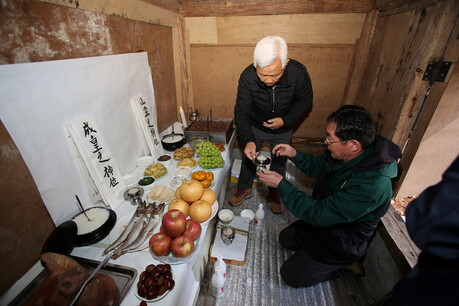A somber and desolate figure stands in the Hamburg Art Gallery's old building, first floor. Among golden frames and ornate motifs, between paintings by Rembrandt and Rubens, rises a grayish body almost completely hidden under a stained cloth. This figure is called Arcangelo II, yet nothing about it resembles an archangel - a messenger of divine words or leader of heavenly hosts. Instead of standing on a stone pedestal, this angel merely stands on an old wooden crate. Its head is tilted forward, as if in a gesture of penance. And instead of striding proudly, it tentatively pushes its right foot in front of the left. Both feet are bare and wrinkled, standing so close together that one fears the angel might stumble and fall from its crate at the next step.
The work is "simultaneously archaic and contemporary," says Alexander Klar, director of the Art Gallery, about Arcangelo II. It was created in 2020 by Belgian artist Berlinde De Bruyckere. Just one year later, it came to the Art Gallery, acquired with help from the Hamburg Art Collections Foundation. There it now stands, surprising all who hadn't expected such an apparition among the Old Masters.
This summer also marks the first exhibition of Berlinde De Bruyckere in Hamburg, at the Ernst Barlach House in Jenisch Park. "Lift Not the Painted Veil" is the title of the exhibition, a quote from a poem by British Romantic Percy Bysshe Shelley (husband of Mary Shelley, who wrote Frankenstein). In Günter Plessow's translation, the poem begins: "Lift not the painted veil which those who live call Life." So yes, it gets dark.
Berlinde De Bruyckere visited the Ernst Barlach House when she was in Hamburg to set up her Arcangelo II in the Art Gallery. She found this inspiring, she writes in the exhibition's accompanying booklet. The sculptor Barlach also created miserable figures whose bodies are hidden under veils and cloths, such as the Veiled Beggar Woman (1919). In the juxtaposition, one can easily understand what connects the artist and the female artist, even though both work with completely different materials. Barlach carved his beggar woman in walnut wood, while De Bruyckere works with wax, linoleum, iron, animal skins, and epoxy resin, which is a plastic.
At the Ernst Barlach House, we also encounter the archangel from the Art Gallery again. And indeed, now he has fallen: under the title Liggende Arcangelo III (2023), he lies with his chest on the ground, only his naked feet protruding lifelessly from under the cloth. The exhibition "Lift Not the Painted Veil" will probably not cheer anyone up. But if you're looking for something to do on one of these gray, cloud-covered days, then perhaps a trip to Jenisch Park is worthwhile.
Meanwhile, Hamburg faces significant transportation disruptions. Tonight at 8:34 PM, the last train for now will leave Central Station traveling directly to Berlin. After that, the Hamburg-Berlin railway line will be completely closed for nine months. The approximately 280-kilometer route is scheduled for general renovation until April 30 of next year. Long-distance trains will be rerouted via Lüneburg and Stendal. Until Monday, the railway and S-Bahn route between Altona and Central Station via Dammtor remains closed. Regional trains to Kiel and Flensburg begin and end in Altona. Long-distance trains from Berlin, Hannover, and Bremen do not travel to Altona.
Two months after the knife attack at Central Station, the Senate has adopted a strategy against serious violent crimes by mentally ill people. With the help of the "Hamburg Network for Person-Based Risk Management," the Interior, Social, and Justice departments want to exchange information better than before. This way, possible danger to others should be recognized earlier when dealing with the mentally ill. Additional measures are intended to improve care for patients.
The School Authority continues its vacation learning program. For this, students voluntarily come together during holidays to deepen what they've learned in small groups and catch up on gaps. One can sense "with what eagerness and joy the children are involved," said School Senator Ksenija Bekeris (SPD) after visiting the program at Mümmelmannsberg Elementary School. The vacation learning program originated in 2020 as a response to the coronavirus pandemic. After federal funding ended, the School Authority has been financing the program itself since 2023. Typically, around nine children learn together in week-long courses.
In brief news updates: The number of unemployed in Hamburg grew in July to 95,018 people, or 8.4 percent. A year ago, the rate was 8.1 percent. The German Weather Service plans to offer daily pollen flight forecasts in the future. First measuring stations have been put into operation in Hamburg, among other places. From police reports: In Ottensen, a man and woman apparently shot at construction workers with an air gun. And: One month after a knife attack in St. Georg, police have arrested a suspect.
Regarding real estate developments, negotiations over the Holsten area continue. The municipal housing company Saga has been dealing with the Holsten Quarter for ten years, according to board member Thomas Krebs. "This is now the third attempt." For four years, nothing has happened on the site of the former Holsten Brewery, covering 86,500 square meters. The previous owner, real estate group Adler, had promised to build 1,300 apartments here, but after a lengthy partial demolition of the brewery buildings, the project stalled. Adler has accumulated high debts, and to pay them back, the company wants to sell the Holsten Quarter. The property has been on the market for two years.
Now a buyer finally seems to have been found: In mid-July, Saga announced that it, together with private housing company Quantum, had "received exclusivity to purchase the Holsten area in Hamburg-Altona." This means the struggling real estate group Adler is now negotiating only with the Saga-Quantum consortium. All other bidders, including a consortium around Hamburg major investor Dieter Becken, are out of the running. However, this doesn't mean the sale of the Holsten Quarter is sealed. "First, we only have exclusivity," says Saga board member Thomas Krebs. "It's nothing more than that." They are now negotiating "the necessary details."
For cultural enthusiasts, there's also the "Parkomania" exhibition in Jenisch Park, showing the creation and development of the popular Hamburg park that belonged to the estate of Caspar Voght, established from 1785. It was designed as a mixture of utility garden and English landscape garden. Today it's a pure landscape park open to all people, and the former summer residence has become a museum, the Jenisch House. The exhibition "Parkomania. Untold Stories from Jenisch Park" runs until September 6 at Jenisch House, Baron-Voght-Straße 50, Monday and Wednesday-Sunday, 11 AM-6 PM, closed Tuesdays.
At tomorrow's Spektrum Festival, Hamburg rapper Disarstar will be one of the headliners. He has worked toward this goal for ten years, since his first album appeared. Disarstar wants to be an artist, he says, not an entertainer. For him, this means not playing a role, being sincere, and having no fear, not even of embarrassment.
A charming local anecdote comes from the weekly market at Spritzenplatz in Ottensen: A group of kindergarten children practices shopping. Each child gets to buy an apple at the fruit stand. One girl comes back excitedly to the group and calls out: "My apple is named Elsa!" A friend responds: "That's called Elstar."





























